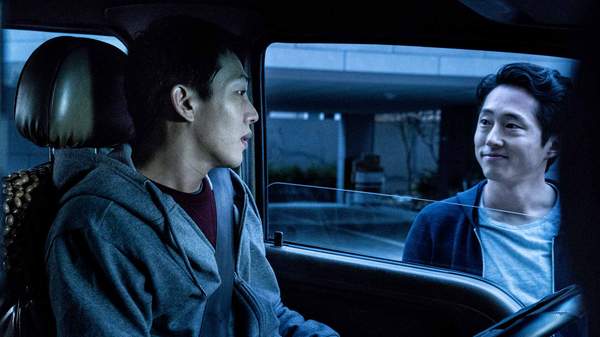Overview
UPDATE: 12 August, 2020: Burning is available to stream via iTunes.
A part-time deliveryman's worried face reflects the entire world's problems in Burning. Played by the quietly expressive Yoo Ah-in, Jongsu never seems as if he'll allow himself even a second's rest and relaxation. He looks stressed when he's walking the Seoul streets during his rounds. He appears anxious when he happens to run into his former neighbour, Haemi (Jun Jeong-seo), who he can't actually remember properly. Whether the pair is reconnecting intimately, Jongsu is feeding Haemi's cat while she travels to Africa, or he's visibly unimpressed when she returns with the cooly charming Ben (Steven Yeun) on her arm, he's never at peace. A silent stare and inner solace aren't the same thing, as Jongsu's complicated gaze makes so plain again and again.
What some filmmakers can't convey with an enormous cast of actors, Lee Chang-dong achieves with the captivatingly melancholy Yoo. What some can't manage across several movies, the writer-director does in mere seconds here. Lee is no cinematic slouch — this is his sixth stint behind the camera, joining a spate of rightfully applauded tiles such as Peppermint Candy, Oasis, Secret Sunshine and Poetry — but there's a particular alchemy to Burning from its opening moments. A love triangle that's also a slow-burning thriller as well as a potent statement on class and gender divisions in modern South Korean society, the film captures a world so visually detailed and emotionally loaded that every frame entices and intrigues. It captures the world, not just a world — from pretty young women selling dreams via lottery tickets, to the chasm between the haves and the have nots, to the feeling that everything, everywhere is always ablaze.
When Jongsu and Haemi cross paths, she sells him a dream, too — of being a couple, of a life beyond the abandoned Paju family farm he's just moved back to, and of a future that's not just one routine struggle after another. When she arrives back from her trip with the canny, confident Ben, the jealous Jongsu sees that fantasy slip away. Worse, he sees how starkly different everything is for someone of wealth, comfort and means. "There is no difference between playing and working," Ben offers without a blink, a statement that couldn't be more piercing to someone whose existence is all work and woe and inertia, and rarely any play. But, adapting a short story from Haruki Murakami's The Elephant Vanishes, Lee finds an especially stunning way to build and dissect the pair's rivalry.
A ruminative mystery, a fine-tuned character study and an intricately observed examination of human relationships all at once, one of the joys of Burning is its wholesale aversion to simplicity. Here, as in reality, nothing is straightforward. Indeed, Lee takes life's enigmas and puzzles, thrusts them into view and forces the audience to ponder along with him. His film doesn't just ask how well you can really know someone, but whether you can ever actually know someone — and if, with Haemi, Jongsu even does. As it watches its increasingly paranoid protagonist yearn for his new love and stew over his competitor, this haunting, penetrating movie doesn't just wonder what a person is capable of, or what we're willing to embrace and ignore, but how we learn to reconcile the contradictions and ambiguities of human nature that we experience every single day.
Lee has always favoured an observational, unobtrusive directorial style, allowing the camera to roam and linger when it needs to, and letting his actors express what they need to to get his stories across. He's also a deft hand at crafting strong but slippery scripts — narratives that say much but leave plenty unsaid, and leave ample room for interpretation. Burning fits the mould, although there is no mould when it comes to the filmmaker. Rather, Lee deploys the same general approach, applies it to a new tale and ensures that the result always feels fresh. The space that he carves out in Burning, and the freedom he gives his exceptional cast, is revelatory. In affording viewers the scope to glean their own insights, sift through their own complexities and come to their own conclusions, this 148-minute movie proves revelatory for everyone.
Back to the stellar trio that Lee pushes front and centre, though — not just experienced South Korean star Yoo, but first-timer Jun and The Walking Dead's Yeun as well. Burning would be a lesser film without any of them, with the distance in Jun's performance (the sensation that there's always something just out of reach, specifically) so perfectly attuned to the movie's mood. If Yoo is the picture's face of anxiety, uncertainty and fragile masculinity, however, then the ever-impressive Yuen is its sly, murky, tantalisingly elusive core. How fitting it is that Burning, like Haemi, spends its time caught between the two — and utterly refuses to be pinned down by choice.
